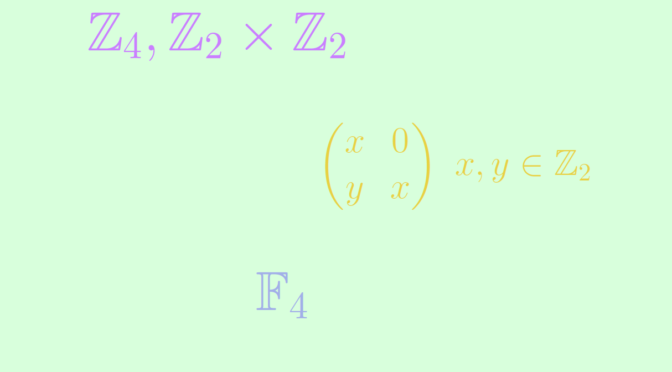A group with four elements is isomorphic to either the cyclic group \(\mathbb Z_4\) or to the Klein four-group \(\mathbb Z_2 \times \mathbb Z_2\). Those groups are commutative. Endowed with the usual additive and multiplicative operations, \(\mathbb Z_4\) and \(\mathbb Z_2 \times \mathbb Z_2\) are commutative rings.
Are all four elements rings also isomorphic to either \(\mathbb Z_4\) or \(\mathbb Z_2 \times \mathbb Z_2\)? The answer is negative. Let’s provide two additional examples of commutative rings with four elements not isomorphic to \(\mathbb Z_4\) or \(\mathbb Z_2 \times \mathbb Z_2\).
The first one is the field \(\mathbb F_4\). \(\mathbb F_4\) is a commutative ring with four elements. It is not isomorphic to \(\mathbb Z_4\) or \(\mathbb Z_2 \times \mathbb Z_2\) as both of those rings have zero divisor. Indeed we have \(2 \cdot 2 = 0\) in \(\mathbb Z_4\) and \((1,0) \cdot (0,1)=(0,0)\) in \(\mathbb Z_2 \times \mathbb Z_2\).
A second one is the ring \(R\) of the matrices \(\begin{pmatrix}
x & 0\\
y & x\end{pmatrix}\) where \(x,y \in \mathbb Z_2\). One can easily verify that \(R\) is a commutative subring of the ring \(M_2(\mathbb Z_2)\). It is not isomorphic to \(\mathbb Z_4\) as its characteristic is \(2\). This is not isomorphic to \(\mathbb Z_2 \times \mathbb Z_2\) either as \(\begin{pmatrix}
0 & 0\\
1 & 0\end{pmatrix}\) is a non-zero matrix solution of the equation \(X^2=0\). \((0,0)\) is the only solution of that equation in \(\mathbb Z_2 \times \mathbb Z_2\).
One can prove that the four rings mentioned above are the only commutative rings with four elements up to isomorphism.

